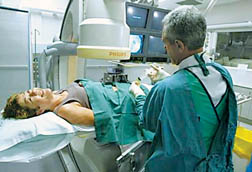|
dailynews |
|
|
|
|
|
OTHER LINKS |

|

|

|
Seaweed dispenser gives hope to diabetics
DIABETES: A NEW treatment for type 1 diabetes using a brown seaweed extract may ultimately mean an end to daily injections for many of the 130,000 Australians who live with the disease. During the first clinical trial yesterday, doctors at Prince of Wales Hospital injected Janice Stewart, a diabetic, with insulin-producing cells encased in microscopic perforated capsules of seaweed extract. If the trial goes as expected, many patients might have to take only one or two injections in a lifetime, instead of several a day. The insulin-producing cells sit in a patient's abdomen, releasing insulin but guarded from the body's immune system by the seaweed shell. Tiny holes in the seaweed allow insulin to enter the patient's bloodstream, and let in nutrients to feed the cells, but are small enough to keep out antibodies. The catch is that the insulin-producing cells must be gathered from the pancreas of a non-diabetic organ donor who died very recently. They must then be placed inside the seaweed microcapsules, which are only about three-thousandths of a millimetre in diameter - a process likened to "blowing in soap bubbles" by the University of NSW researcher Professor Bernie Tuch, who is leading the research team at Prince of Wales Hospital in Randwick. "Even if we are able to get numbers of people like Janice off insulin, the supply problem is enormous," Professor Tuch said. "Last year, for example, there were 204 people who died and donated their organs. There are 130,000 people like Janice in this country." A shortage of donors means the new treatment, if successful, would for the time being only be used to supplement existing treatments, which require regular injections of anti-rejection drugs. Ms Stewart, 51, said she felt "absolutely fantastic" after being injected with the seaweed microcapsules. She developed the disease 40 years ago, and has been taking four insulin injections a day. "If it works I think it's the best thing that's happened for diabetes since the discovery of insulin," said Ms Stewart, who is a nurse at Prince of Wales Hospital and is one of six diabetics taking part in the trial. "At the minimum it will mean less insulin [injections] for me. Hopefully for the kids of today who are developing diabetes at the age I did - they may not have a whole lifetime of it." The NSW chief executive of Diabetes Australia, Liz Peers, said the organisation strongly supported the trials and looked forward to the results. SUNDAY MORNING HERALD |




